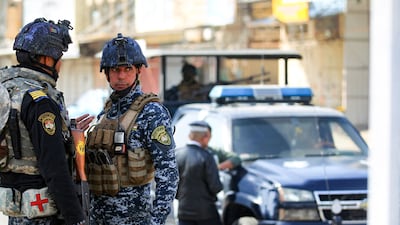Gunmen shot and killed a judge specialising in drug-related cases on Saturday, in the southern province of Maysan. Officials say the province, which borders Iran, has become a focal point for drug trafficking.
Judge Ahmed Faisal Khasaf was driving home in his car in the provincial capital of Amara when assailants blocked his route and sprayed his vehicle with bullets, AFP reported, citing a police officer and a forensic official.
Faiq Zaidan
Mr Khasaf was shot 15 times with a Kalashnikov and died on the spot after suffering gunshot wounds to the head and chest, they said.
The identity of the killers remains unknown. Judicial authorities have launched an investigation.
The Head of Iraq’s Supreme Judicial Council, Judge Faiq Zaidan, decried the assassination as a “cowardly and terrorist act that was carried out by criminal gangs”.
Mr Zaidan described the judge as “brave and competent in facing the outlaw gangs”.
In September, another anti-drug judge escaped an assassination attempt in the same province, AFP said.
Drug trafficking and abuse have been growing rapidly in Iraq since the 2003 US-led invasion that toppled Saddam Hussein.
Since then, the country has been transformed from being a corridor for smuggling drugs to neighbouring countries, to a place where consumption is hitting unprecedented levels.
Security and health officials blame what they describe as successive weak governments, as well as widespread corruption among security forces, porous borders and a lack of co-operation between government agencies as the main reasons behind the rise.
A growing sense of lawlessness has also been apparent in Maysan province.
It is not only at the heart of the country’s thriving drug scene, but has also witnessed a rise in bloody tribal disputes, where confrontations can last for days with security forces unable to prevent the violence.
In a recent dispute between two major tribes, Katyusha rockets were used, security and local officials said, injuring an unconfirmed number of people.
Judge Zaidan held the security forces in the province accountable for their “clear shortcoming in doing their duties”.
Initial reports, he said, indicated a “wilful negligence for not taking the necessary measures to ensure security in the province”.
The assassination came days after the murder of an Interior Ministry officer in Maysan and the killing of an Interior Ministry colonel during a raid to hunt down a drug dealer in the southern Diwaniyah province.
In a statement, Iraqi Prime Minister Mustafa Al Kadhimi dispatched a high-ranking security committee headed by the Interior Minister to the province to investigate the latest killings and evaluate the security situation.
Mr Al Kadhimi described the assassinations as "organised criminal acts" and vowed that the government "will not stay motionless about these heinous crimes that threaten peace and stability".
"Our security forces will spare no effort to enforce law and to bring criminals to justice," he added.
At the slain judge's funeral, his coffin was wrapped in the Iraqi flag with a bouquet of flowers during a procession on Sunday morning. Dozens of sobbing mourners walked behind the pick-up truck carrying his casket.
"The province is uncontrollable," a man identified himself as Mr Kasaf's brother said in a video clip uploaded to social media, while tightly holding a sobbing woman.
"The government can't protect itself, there are a lot of rifles around," he added.
Security and health officials have been warning that violence linked to drug dealing is spiralling out of control, while authorities are under-resourced to deal with the problem.
Crystal meth, a synthetic drug — produced using man-made chemicals as opposed to plants — is widely used in Iraq. It comprises about 60 per cent of the country’s drug trade, the government says. The second most popular drug is Captagon, having overtaken tramadol, heroin and hashish in terms of use.
Interior Ministry figures show that authorities seized about 420 kilograms of crystal meth and 50 to 60 million Captagon tablets in the first half of last year. That was more than 20 times the amount seized in the previous two years combined.
Security forces have intensified efforts to crack down on the trade, often announcing drug seizures and the arrest of traffickers on a daily basis.


